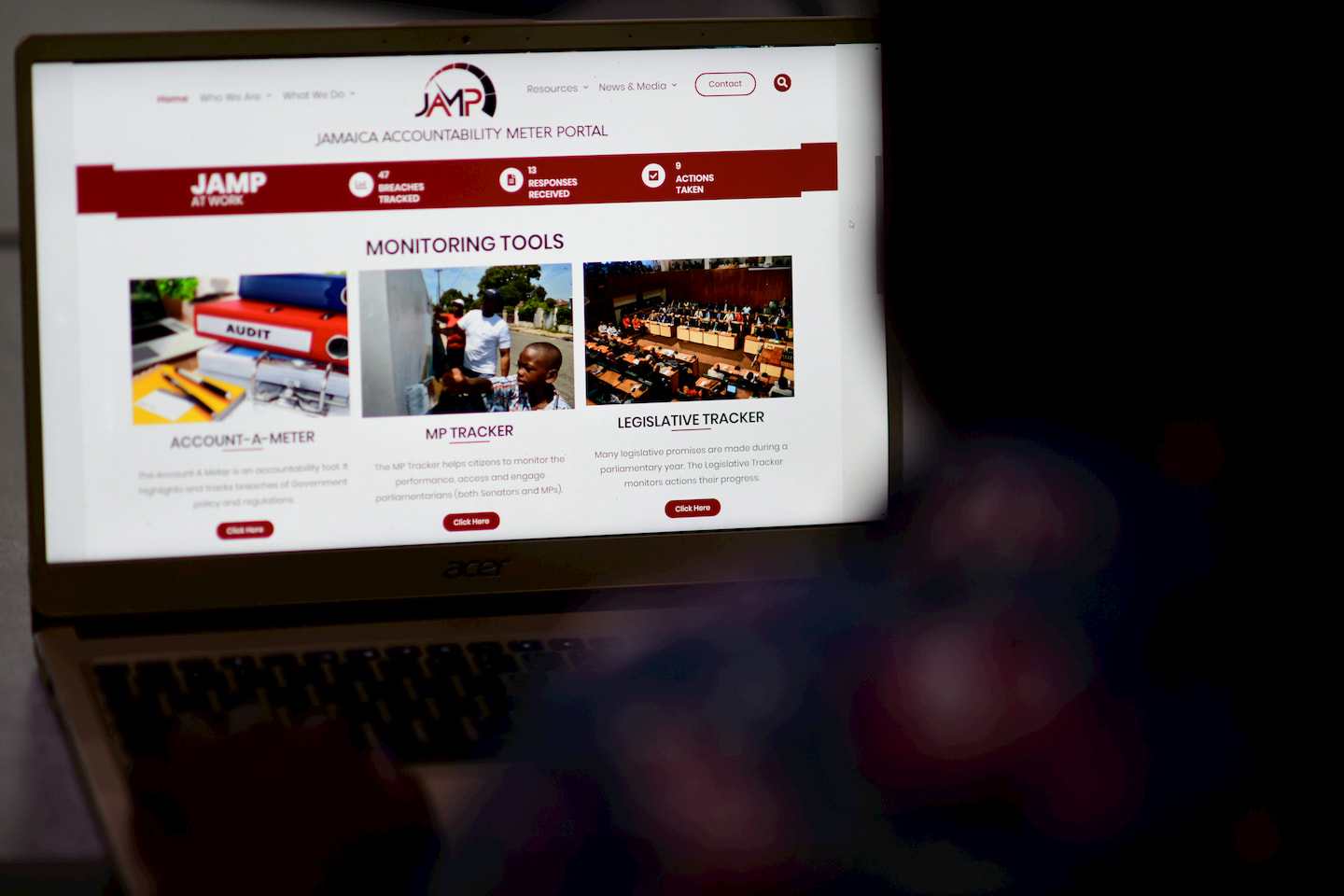I am proud to be associated with the Jamaica Accountability Meter Portal (JAMP) as a member of its board. It’s a groundbreaking, potentially revolutionary website – revolutionary because of the knowledge that it affords those who use it and what action can flow from such knowledge.
With a simple click, jampja.org allows you to track what ministries, departments and agencies of government have done to remedy breaches found by the Auditor General’s Department. It tells you who the accountable officers are and gives you their contact information so that, as a member of the public, you can make your views known to them.
With the site’s MP tracker, you can now track members of parliaments’ attendance in Parliament and on assigned committees; find out what they’ve done with their Constituency Development Fund (CDF) allocation, and communicate directly to them. The ‘Legislative Tracker’ enables you to track the progress of key bills tabled in Parliament and to send messages to MPs on what you think about the bills and/or the pace at which Parliament is acting on them; and so much more.
For the avoidance of bias, JAMP only uses, as content and the basis for all its information, available, public data generated by official, national sources – reports of the Auditor General’s Department and the Integrity Commission, parliamentary records, reports from the Constituency Development Fund Unit, and responses that ministries, departments and agencies make to access to information requests, etc. If the record of attendance in Parliament says an MP has been there X times out of Y, that is what you will see on the site.
JAMP is committed to being, and describes itself as, “an independent, non-partisan, non-governmental organisation. Following its launch on October 16, 2019, there was conversation on social media and elsewhere, about the site, the importance of what it has to offer, who the people are behind it, where its funding comes from, and about its claim of being non-partisan.
One of the persons who raised questions on social media about the claim of non-partisanship and the independence of the people behind the website and organisation was MP Juliet Cuthbert-Flynn. MP Cuthbert-Flynn tweeted the following question and comment on October 17:
Is this non- partisian group non voters? Due to our history it's rather difficult to believe such a group will not have biases. I would like to know who each member voted for in the last election. My office is ready to cooperate.
— Juliet Cuthbert-Flynn, OLY (@julietcuthbert) October 18, 2019
This is an important tweet on many levels. It provides a great teachable opportunity. First, voting is not, by definition, an expression of partisanship, and ‘non-partisan’ definitely doesn’t mean non-voting. What is meant by ‘non-partisan’? It means not being biased towards any particular political group. ‘Bias’ means being in favour of, or against, a thing, person or group usually in a way that is closed-minded, prejudicial, or unfair. You definitely can be a voter and remain open-minded and fair.
In relation to parties, not being biased or partisan means being able to see the good, bad, positive and negative of all, not stifling your conscience when you see a wrong or being stingy with your praise because the good has been done by this party or that. Some people, believe it or not, vote (or not) based on parties’ espoused policies and principles, reputation of candidates and/or parties, an assessment of competence and track record of candidates and parties, among other criteria.
These are the kind of people who can, and do, vote for different parties; for the same party repeatedly if it performs or against it, or abstain from voting if it doesn’t. They will vote for whomever they consider the better/best candidate for their constituency despite the party they belong to. And, they are equal-opportunity critics. If you’re wrong, you’re just wrong, or right, in their book. They will say so to your face, behind your back, and say so publicly.
Voting is a civic responsibility. It doesn’t require that you be, nor does it suggest that you are, a slave to any one party. It is a right enshrined in the Constitution accorded to every person registered to vote. The Representation of the People Act of 1944, last amended 2012, mandates secrecy of the choice of candidate that an elector votes for on election day.
Sadly, because we have had political leaders who believed that electors should slavishly vote for their party, no matter what, and believed in coercing people to vote accordingly, various practices were introduced, including creating political garrisons engineered and forced to have people of the same political persuasion and where open voting was enforced ruthlessly.
People were beaten if they tried to vote secretly and if they didn’t go out to vote early enough. People who were thought to not be loyal to whichever party risked their homes being torched and being driven out of communities or, worse, killed.
It was party loyalty on pain of injury, exile, or death. Many younger leaders, community members and members of the electorate nurtured in that political culture thought it was normal. Fortunately, the Electoral Advisory Committee (1979), later becoming the Electoral Commission (2006), was brought into being as a safeguard. Now, our electoral process is held up as a model backed by the enforcement of law.
On the ground, though, the psychological coercion – promises to favour or starve communities for voting this way or that; and various forms of corrupt inducement, aka vote-buying, persist, and a politically tribal mindset characterises much of our electoral discourse.
Against the background of the history above, MP Cuthbert-Flynn’s insinuation that if the voting pattern of persons associated with JAMP did not, presumably, accord with her own, that would mean they were biased as to make them partisan, as to make the site untrustworthy, is sad. Her comment – “I would like to know who each member voted for in the last election” – is troubling.
Carol Narcisse is an educator, social policy analyst and civil society advocate.







